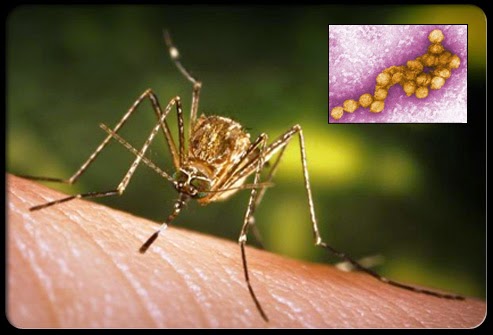The principal symptoms of dengue are:
High fever and at least two of the following:
- Severe headache
- Severe eye pain (behind eyes)
- Joint pain
- Muscle and/or bone pain
- Rash
- Mild bleeding manifestation (e.g., nose or gum bleed, petechiae, or easy bruising)
- Low white cell count
Generally, younger children and those with their first dengue infection have a milder illness than older children and adults.
Watch for warning signs as temperature declines 3 to 7 days after symptoms began.
Go IMMEDIATELY to an emergency room or the closest health care provider if any of the following warning signs appear:
- Severe abdominal pain or persistent vomiting
- Red spots or patches on the skin
- Bleeding from nose or gums
- Vomiting blood
- Black, tarry stools (feces, excrement)
- Drowsiness or irritability
- Pale, cold, or clammy skin
- Difficulty breathing
Dengue hemorrhagic fever (DHF) is characterized by a fever that lasts from 2 to 7 days, with general signs and symptoms consistent with dengue fever. When the fever declines, warning signs may develop. This marks the beginning of a 24 to 48 hour period when the smallest blood vessels (capillaries) become excessively permeable (“leaky”), allowing the fluid component to escape from the blood vessels into the peritoneum (causing ascites) and pleural cavity (leading to pleural effusions). This may lead to failure of the circulatory system and shock, and possibly death without prompt, appropriate treatment. In addition, the patient with DHF has a low platelet count and hemorrhagic manifestations, tendency to bruise easily or have other types of skin hemorrhages, bleeding nose or gums, and possibly internal bleeding.
Treatment
There is no specific medication for treatment of a dengue infection. Persons who think they have dengue should use analgesics (pain relievers) with acetaminophen and avoid those containing ibuprofen, Naproxen, aspirin or aspirin containing drugs. They should also rest, drink plenty of fluids to prevent dehydration, avoid mosquito bites while febrile and consult a physician.
As with dengue, there is no specific medication for DHF. If a clinical diagnosis is made early, a health care provider can effectively treat DHF using fluid replacement therapy. Adequately management of DHF generally requires hospitalization.





